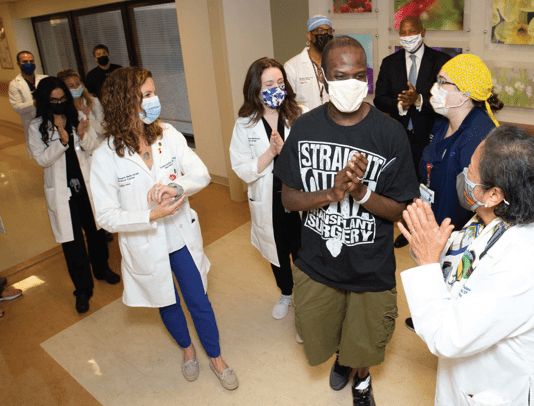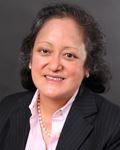“I felt normal...I felt like before I got sick.”

A young father's unexpected heart failure was successfully treated with a heart transplant.
At 34, Derrick Baker had no history of heart disease. In fact, the healthy young father of five had never had a major illness.
This past December, however, he began to feel weak and nauseous. He was short of breath and had stomach pains. His wife, Tameka Reed, took him to Newark Beth Israel Medical Center (NBI), not far from their home. “He would walk past Newark Beth every day, but he’d never been there for treatment before,” Tameka says. “I figured it would turn out to be a stomach virus.”
As doctors tested Derrick, they came to a conclusion that shocked him and Tameka: He had heart failure, had likely had undetected heart issues for years and was at risk of sudden death.

“Sometimes a person can have cardiac problems but is able to tolerate them because of their youth and physical fitness,” says Margarita Camacho, MD, Surgical Director of Heart Transplant at NBI and a member of RWJBarnabas Health Medical Group. “While there’s no obvious sign of their heart issue, their hearts are actually barely functioning.” The cause of heart failure in such people is generally a mystery, although doctors speculate that there may be a genetic component.
The team at NBI prescribed heart failure medications. After 10 days, just before Christmas, Derrick went home to Tameka and their five children—ages 4, 8, 11, 14 and 17 years old. Within a short time, however, he suddenly lost the ability to speak. “I was talking to the kids, and then I couldn’t talk anymore,” he recalls. He’d had a stroke, and he was readmitted to the hospital.
He recovered his speech, but continued to need heart failure medication and have frequent stays at NBI. By March, his condition had deteriorated to the point where his heart was operating at just 5 percent, and the function of his kidneys and liver were being affected.
Derrick would need a heart transplant. In April he was admitted to the hospital to begin the wait for a suitable heart to be available.
Waiting For Word
At any given time, the number of people who are waiting for a heart transplant is greater than the number of organs available. The average wait time is four months, according to the Gift of Life Donor Program, but many factors can lengthen that time, such as blood tissue and size match and proximity to the donor.
Derrick was lucky in one sense: His surgery would be done by Dr. Camacho, one of the nation’s most renowned cardiac surgeons. She has completed 655 of the 1,126 heart transplants done at NBI and has personally helped procure more than 500 hearts for transplant.
As Derrick waited for his transplant, his children created a collage of photos of their family, which the medical team posted on his hospital room window. “Looking at it, I couldn’t wait to get home,” he says. They were able to visit until April, when his oldest daughter got COVID-19 and they all were quarantined. FaceTime visits would have to do.
In mid-May, a potential donor heart became available, but unfortunately it fell through, as is often the case with organ transplants. Days later, a call came about another available heart—and this time it was a good, strong heart and a match. The surgery was scheduled for 6:30 a.m. on Memorial Day.
As she scrubbed up, Dr. Camacho thought about Derrick and his family, and the impact this heart transplant would have on their lives.
Home Again
The surgery was a success. Within a day or two, Derrick was able to get out of bed. “I felt normal,” he recalls. “I felt like before I got sick.”
On June 15, he walked out of the hospital on his own two feet, “clapped out” by NBI staff and Dr. Camacho.
At home, his children were waiting for him with balloons, cheers and hugs. That weekend, he celebrated his first Father’s Day with his new heart. Later that month, he was able to see one daughter graduate from high school and another from middle school.
The future is bright. Derrick is doing as well as his doctor had hoped. Most heart transplant patients feel physically recovered by six weeks after the procedure, and the first six months continue to be crucial for healing. Doctors perform regular tests to ensure that the heart is not being rejected by the body and that no infection has occurred. Once Derrick is fully recovered, he will not have any physical restrictions, Dr. Camacho says, although he will have diet and lifestyle restrictions as all heart transplant patients do.
Despite achieving a transplant record that puts her in the top 1 percent of surgeons, Dr. Camacho says she never takes the procedure for granted. “Even if I did it only once in my life,” she says, “it would be so incredibly meaningful to me and I would still feel so privileged.”
Whoever your heart beats for, our hearts beat for you. To find a top cardiovascular specialist or learn more about heart transplant specialists at Newark Beth Israel Medical Center, call 888-724-7123.